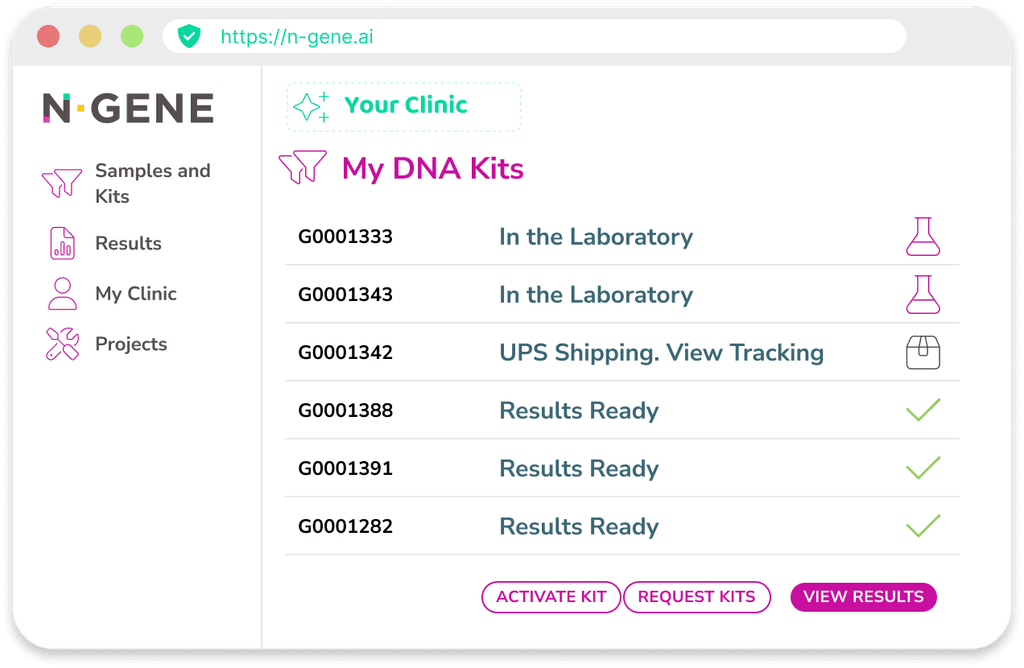The genetic solution for Nutritionists
The genetic solution for Nutritionists
The genetic solution for Nutritionists
Integrate genetics into your nutritional consultation with N-Gene, the software for nutrition professionals that offers personalized solutions to your clients with genetic studies and grows your business.
Integrate genetics into your nutritional consultation with N-Gene, the software for nutrition professionals that offers personalized solutions to your clients with genetic studies and grows your business.



The most comprehensive
Explore our solutions
The most comprehensive
Explore our solutions
Multiple variants
Explore the predisposition and protection of:
Intolerances and celiac disease
Celiac Disease (Gluten)
The genotype HLA-DQ2 and/or HLA-DQ8 is associated with a genetic predisposition to celiac disease, while its absence significantly reduces the likelihood of developing this condition. The identification of these genetic markers allows for the assessment of risk and improves the customization of dietary strategies, facilitating a more accurate diagnosis.
Histamine intolerance
The genotype in variants of the gene AOC1 (DAO) may influence the ability to degrade histamine, which can increase the predisposition to intolerance to this biogenic amine. The variants that reduce the activity of the enzyme diamine oxidase (DAO) may favor the accumulation of histamine and trigger adverse symptoms.
Lactose intolerance
The CC genotype at the SNP C/T_13910 indicates a high genetic predisposition to lactose intolerance, while the C/T or T/T genotypes indicate lactase persistence and thus a lower predisposition to this intolerance. Knowing this information allows for a personalization of guidelines and dietary treatments in professional consultation.
Sucrose intolerance
The variants in the SI gene, which encodes the enzyme sucrase-isomaltase, can affect the digestion of sucrose, predisposing individuals to intolerance to this disaccharide. Alterations in enzymatic activity can lead to digestive symptoms when consuming foods with sucrose. Identifying these variants allows for the personalization of diet and improvement of quality of life through tailored nutritional recommendations.
Intolerances and celiac disease
Celiac Disease (Gluten)
The genotype HLA-DQ2 and/or HLA-DQ8 is associated with a genetic predisposition to celiac disease, while its absence significantly reduces the likelihood of developing this condition. The identification of these genetic markers allows for the assessment of risk and improves the customization of dietary strategies, facilitating a more accurate diagnosis.
Histamine intolerance
The genotype in variants of the gene AOC1 (DAO) may influence the ability to degrade histamine, which can increase the predisposition to intolerance to this biogenic amine. The variants that reduce the activity of the enzyme diamine oxidase (DAO) may favor the accumulation of histamine and trigger adverse symptoms.
Lactose intolerance
The CC genotype at the SNP C/T_13910 indicates a high genetic predisposition to lactose intolerance, while the C/T or T/T genotypes indicate lactase persistence and thus a lower predisposition to this intolerance. Knowing this information allows for a personalization of guidelines and dietary treatments in professional consultation.
Sucrose intolerance
The variants in the SI gene, which encodes the enzyme sucrase-isomaltase, can affect the digestion of sucrose, predisposing individuals to intolerance to this disaccharide. Alterations in enzymatic activity can lead to digestive symptoms when consuming foods with sucrose. Identifying these variants allows for the personalization of diet and improvement of quality of life through tailored nutritional recommendations.
Intolerances and celiac disease
Celiac Disease (Gluten)
The genotype HLA-DQ2 and/or HLA-DQ8 is associated with a genetic predisposition to celiac disease, while its absence significantly reduces the likelihood of developing this condition. The identification of these genetic markers allows for the assessment of risk and improves the customization of dietary strategies, facilitating a more accurate diagnosis.
Histamine intolerance
The genotype in variants of the gene AOC1 (DAO) may influence the ability to degrade histamine, which can increase the predisposition to intolerance to this biogenic amine. The variants that reduce the activity of the enzyme diamine oxidase (DAO) may favor the accumulation of histamine and trigger adverse symptoms.
Lactose intolerance
The CC genotype at the SNP C/T_13910 indicates a high genetic predisposition to lactose intolerance, while the C/T or T/T genotypes indicate lactase persistence and thus a lower predisposition to this intolerance. Knowing this information allows for a personalization of guidelines and dietary treatments in professional consultation.
Sucrose intolerance
The variants in the SI gene, which encodes the enzyme sucrase-isomaltase, can affect the digestion of sucrose, predisposing individuals to intolerance to this disaccharide. Alterations in enzymatic activity can lead to digestive symptoms when consuming foods with sucrose. Identifying these variants allows for the personalization of diet and improvement of quality of life through tailored nutritional recommendations.
Biomarkers
Biomarkers
Biomarkers
Vitamins, minerals, and omegas
Vitamins, minerals, and omegas
Vitamins, minerals, and omegas
Metabolizers
Metabolizers
Metabolizers
Hormones and neurotransmitters
Hormones and neurotransmitters
Hormones and neurotransmitters
Effectiveness of diets and metabolic health
Effectiveness of diets and metabolic health
Effectiveness of diets and metabolic health
Fitness
Fitness
Fitness
Diseases - Circulatory System
Diseases - Circulatory System
Diseases - Circulatory System
Diseases - Digestive System
Diseases - Digestive System
Diseases - Digestive System
Diseases - Endocrine System
Diseases - Endocrine System
Diseases - Endocrine System
Diseases - Nervous System
Diseases - Nervous System
Diseases - Nervous System
Diseases - Skeletal System
Diseases - Skeletal System
Diseases - Skeletal System
Diseases - Reproductive System
Diseases - Reproductive System
Diseases - Reproductive System
Save time
Save time
Explore genetic data easily
Register your patients
Request kits and pickups
Generate reports in PDF
Receive AI-powered insights
Register your patients
Monitor the progress of your clients' samples efficiently: assign an alias to every sample and track its status instantly

Register your patients
Request kits and pickups
Generate reports in PDF
Receive AI-powered insights

Register your patients
Monitor the progress of your clients' samples efficiently: assign an alias to every sample and track its status instantly
Register your patients
Request kits and pickups
Generate reports in PDF
Receive AI-powered insights

Register your patients
Monitor the progress of your clients' samples efficiently: assign an alias to every sample and track its status instantly
Shall we talk?
Shall we talk?
Shall we talk?
Contact us and request a demo without obligation
Contact us and request a demo without obligation
Contact us and request a demo without obligation
Our experts will provide you with a demonstration of N-GENE and will answer all your questions. Discover all the advantages of integrating genetics into your practice.
Our experts will provide you with a demonstration of N-GENE and will answer all your questions. Discover all the advantages of integrating genetics into your practice.
Our experts will provide you with a demonstration of N-GENE and will answer all your questions. Discover all the advantages of integrating genetics into your practice.
Contact us on WhatsApp

Do You Need to Know More?
Frequently Asked Questions
Frequently Asked Questions
Do I need to be an expert in genetics to interpret the reports?
Do I need to be an expert in genetics to interpret the reports?
Do I need to be an expert in genetics to interpret the reports?
How do I collect the samples from my patients?
How do I collect the samples from my patients?
How do I collect the samples from my patients?
Are the results reliable?
Are the results reliable?
Are the results reliable?
Can this test be used as a diagnosis?
Can this test be used as a diagnosis?
Can this test be used as a diagnosis?
Where do I send the samples and what technology do you use?
Where do I send the samples and what technology do you use?
Where do I send the samples and what technology do you use?
Is it necessary to repeat the test after a few months?
Is it necessary to repeat the test after a few months?
Is it necessary to repeat the test after a few months?
How is the privacy of the samples handled?
How is the privacy of the samples handled?
How is the privacy of the samples handled?
Discover how N-GENE can transform your medical consultation
Discover how N-GENE can transform your medical consultation
Fundamental today, essential tomorrow
The genetic reports from N-GENE are informative and preventive. They do not constitute a medical diagnosis nor do they substitute for individual clinical assessment.
The genetic reports from N-GENE are informative and preventive. They do not constitute a medical diagnosis nor do they substitute for individual clinical assessment.
The genetic reports from N-GENE are informative and preventive. They do not constitute a medical diagnosis nor do they substitute for individual clinical assessment.







